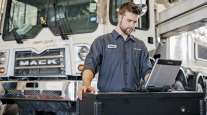Managing Editor, Features and Multimedia
Taking Truck Technology Mainstream

[Stay on top of transportation news: Get TTNews in your inbox.]
It’s no secret within the trucking business that commercial transportation is becoming an increasingly high-tech industry. Modern fleets are utilizing sophisticated management software, vehicle telematics, predictive analytics and active safety systems to run their operations safely and efficiently. And looking ahead, the continued push toward automated driving and zero-emissions powertrains offers us a glimpse at the industry’s potential future.
Outside of trucking, however, these advances and innovations don’t always attract much notice from the public.
That’s why it was refreshing to see droves of technology professionals working in various other industries get a taste of trucking technology at CES 2020 in Las Vegas.

Read more iTECH stories
Amid the vast ocean of consumer and automotive technologies on display at the Jan. 7-10 event, CES attendees also saw heavy- and medium-duty commercial trucks that run on electricity, as well as prototypes that sense and interpret their surroundings to support automated driving capabilities.
Trucking’s presence at the world’s largest technology showcase isn’t just a novelty. It also could serve as a recruiting tool for an industry that too often flies under the radar.
Highlighting the role of technology in freight transportation could broaden the industry’s appeal to a new generation of workers and entrepreneurs who just might consider careers in this essential business.
It also could help change perceptions about trucking.
That was one of the goals of Nikola Motor Co. founder and CEO Trevor Milton, whose company put its hydrogen-electric Nikola Two tractor model on display at Ryder System’s CES exhibit.
“By having this truck here, we can show people that trucking is no longer this industry that is unattractive,” he said. “It’s a beautiful industry. It’s an industry that you can be proud of being part of. And we can also solve a lot of problems.”
Milton, a longtime CES attendee, also noted how the show has expanded beyond its original focus on consumer devices into a much broader technology showcase.
“It was really an electronics show about 10 years ago, and it totally morphed when the automotive industry started becoming cool,” he said. “The automotive industry was never the most exciting industry to be in until the last five years. … Everything that’s awesome is about automotive now. It’s the new thing.”
While an electric truck shaped like a bullet train can certainly inject some panache into what’s often seen as a traditional industry, the overall advance of commercial vehicle technology also could be part of the solution to the trucking industry’s persistent struggle to recruit and retain professional drivers.
The drivers of tomorrow likely will be less interested in polished chrome than they will be in getting behind the wheel of a high-tech, streamlined piece of equipment.
Host Seth Clevenger went to CES 2020 to look at the road ahead for electric-powered commercial vehicles. He spoke with Scott Newhouse of Peterbilt and Chris Nordh of Ryder System. Hear a snippet, above, and get the full program by going to RoadSigns.TTNews.com.
The proliferation of advanced driver-assistance systems also will provide more support for inexperienced drivers, perhaps enabling fleets to expand the pool of potential job candidates as they look to fill open positions and grow their businesses.
While trucks are the most visible symbol of the transportation industry, much of the technology that is transforming the trucking business is in the back office.
Fleet management software is playing a huge part in improving logistics planning, and therefore driver productivity.
Although freight transportation is certainly a crucial component of the economy, it isn’t always flashy.
That’s why it’s valuable to shine the spotlight on the many exciting developments underway in trucking.
Such efforts could yield dividends by gradually changing perceptions and attracting new talent to help lead the industry forward.
Want more news? Listen to today's daily briefing:





